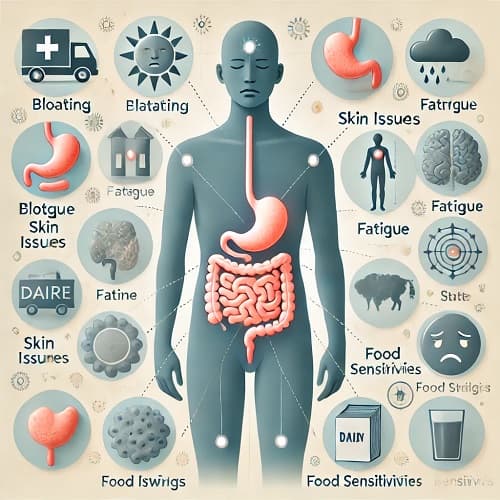
Your gut health affects more than just digestion. It plays a role in immunity, mood, and overall well-being. An unhealthy gut can lead to a range of symptoms. Identifying and addressing these issues can improve your quality of life. In this article you will discover common symptoms of an unhealthy gut and learn how to improve your digestive health for overall wellness.
Also read: Leaky Gut Syndrome: Symptoms, Causes, Diet and Treatment
Table of Contents:
- What Causes an Unhealthy Gut?
- Common Symptoms of an Unhealthy Gut
- Long-Term Effects of Ignoring Gut Health
- 10 Signs of an Unhealthy Gut
- Warning Signs of an Unhealthy Gut and How to Improve It
- How to Fix an Unhealthy Gut
- Can Bad Bacteria Cause Constipation?
- Gut Healing for Beginners Diet
- Signs Your Gut is Healing
- Signs of a Bad Gut Microbiome
- Worst Foods for Gut Health
- Heal Your Gut By Yourself
- How to Starve Bad Gut Bacteria
- Signs of Bad Gut Bacteria
- Poor Digestion Symptoms and Treatment
- Does Bad Gut Bacteria Cause Gas?
- How to Increase Good Bacteria in Gut Naturally
- How to Improve Gut Health Naturally
- When to Seek Professional Help
- Conclusion
- FAQs About Unhealthy Gut Symptoms
What Causes an Unhealthy Gut?
Your gut becomes unhealthy due to poor diet, stress, or lack of sleep. Antibiotics, infections, or processed foods can harm your gut’s balance. These factors disrupt the microbiome, the ecosystem of bacteria in your digestive system.
Common Symptoms of an Unhealthy Gut
1. Chronic Digestive Issues
- Bloating, gas, or diarrhea can signal an imbalance.
- Constipation is another sign of poor gut health.
2. Frequent Fatigue
- Feeling tired despite enough sleep? Your gut may struggle to absorb nutrients.
- Fatigue often links to inflammation caused by a bad gut.
3. Skin Problems
- Acne, eczema, or rashes might connect to gut issues.
- Poor digestion triggers toxins that affect the skin.
4. Food Sensitivities
- Trouble digesting specific foods?
- An unhealthy gut may not break them down properly.
5. Weakened Immunity
- Getting sick often can indicate gut problems.
- Your gut is home to 70% of your immune system.
6. Brain Fog or Anxiety
- Gut issues often affect mental clarity.
- Your gut and brain communicate through the gut-brain axis.
Long-Term Effects of Ignoring Gut Health
If left untreated, poor gut health can lead to chronic diseases. Conditions like IBS, diabetes, or even depression might develop. Prioritize your gut to protect your future health.
10 Signs of an Unhealthy Gut
- Chronic Digestive Issues: Persistent bloating, gas, diarrhea, or constipation.
- Unintentional Weight Changes: Difficulty gaining or losing weight without dietary changes.
- Food Sensitivities: Trouble digesting specific foods, leading to bloating or discomfort.
- Fatigue or Poor Sleep: Difficulty staying energized or falling asleep.
- Skin Problems: Acne, eczema, or unexplained rashes.
- Frequent Illness: A weak immune system and recurring infections.
- Bad Breath: Halitosis can indicate poor digestion or gut imbalance.
- Brain Fog: Trouble concentrating or remembering details.
- Mood Swings: Increased anxiety, depression, or irritability.
- Cravings for Sugar: A sign of an overgrowth of harmful bacteria.
Learn more on 10 Signs of an Unhealthy Gut and How to Fix it
Warning Signs of an Unhealthy Gut and How to Improve It
Signs:
- Digestive problems like diarrhea or constipation.
- Unexplained headaches or migraines.
- Joint pain or inflammation.
- Low energy despite rest.
- Poor focus and mental clarity.
How to Improve It:
- Add fiber, probiotics, and prebiotics to your diet.
- Reduce processed foods and sugar.
- Stay hydrated and manage stress with mindfulness practices.
- Get 7–8 hours of quality sleep each night.
- Exercise regularly to support gut motility.
How to Fix an Unhealthy Gut
- Clean Up Your Diet: Remove processed foods, excess sugar, and artificial additives.
- Introduce Gut-Friendly Foods: Focus on fermented foods like yogurt, sauerkraut, and kombucha.
- Stay Hydrated: Drink plenty of water to aid digestion.
- Take Probiotics and Prebiotics: Support the growth of healthy gut bacteria.
- Limit Antibiotic Use: Only take antibiotics when prescribed to avoid disrupting the gut microbiome.
- Exercise Regularly: Physical activity helps improve digestion.
- Manage Stress: Use techniques like meditation, yoga, or journaling.
Can Bad Bacteria Cause Constipation?
Yes, an overgrowth of harmful bacteria in the gut can disrupt digestion. This imbalance can slow intestinal motility, leading to constipation. Supporting a healthy gut microbiome with probiotics, fiber, and hydration can alleviate constipation.
Gut Healing for Beginners Diet
- Start with Whole Foods: Avoid processed and sugary items.
- Incorporate Probiotic Foods: Yogurt, kefir, kimchi, and sauerkraut.
- Add Prebiotic-Rich Foods: Bananas, onions, garlic, and asparagus.
- Choose Anti-Inflammatory Options: Turmeric, ginger, and fatty fish.
- Stay Hydrated: Water is essential for digestion and detox.
- Limit Trigger Foods: Cut out gluten, dairy, or fried foods if sensitive.
Signs Your Gut is Healing
- Improved digestion with less bloating or gas.
- Regular and healthy bowel movements.
- Better mood and reduced brain fog.
- Increased energy throughout the day.
- Fewer food sensitivities or cravings.
- Enhanced immunity and fewer illnesses.
- Clearer skin and reduced inflammation.
Signs of a Bad Gut Microbiome
- Frequent digestive issues like diarrhea, bloating, or gas.
- Persistent sugar cravings.
- Weak immune function with frequent colds.
- Skin conditions like eczema or rashes.
- Poor mental health, including anxiety or depression.
- Food intolerances or allergies.
- Difficulty losing or gaining weight.
By understanding these signs and adopting gut-friendly habits, you can restore your gut health and improve overall wellness!
Worst Foods for Gut Health
- Sugar and Artificial Sweeteners: Promote harmful bacterial growth and gut inflammation.
- Fried and Processed Foods: High in trans fats and chemicals that harm the gut lining.
- Excessive Alcohol: Disrupts gut bacteria and irritates the digestive system.
- Red and Processed Meats: Difficult to digest and may increase harmful bacteria.
- Dairy Products (for some): Can trigger inflammation or digestion issues in lactose-intolerant people.
- Gluten (for sensitive individuals): May irritate the gut lining or cause discomfort.
- High-Fat Junk Foods: Slow digestion and upset gut bacteria balance.
Heal Your Gut By Yourself
- Eat Whole, Natural Foods: Focus on vegetables, lean proteins, and healthy fats.
- Include Fermented Foods: Yogurt, kimchi, and sauerkraut improve gut bacteria.
- Limit Processed Foods: Avoid sugars and artificial additives.
- Drink Herbal Teas: Chamomile and ginger tea soothe the gut.
- Get Adequate Sleep: Rest helps your body repair the gut lining.
- Stay Hydrated: Water supports digestion and nutrient absorption.
How to Starve Bad Gut Bacteria
- Reduce Sugar Intake: Bad bacteria thrive on sugar.
- Avoid Processed Foods: Remove junk food that encourages harmful bacteria growth.
- Eat Anti-Microbial Foods: Garlic, coconut oil, and oregano can help kill harmful bacteria.
- Limit Simple Carbs: Refined carbs break down quickly into sugars, feeding bad bacteria.
- Increase Fiber: Fiber nourishes beneficial bacteria and crowds out harmful ones.
Signs of Bad Gut Bacteria
- Persistent bloating and gas.
- Frequent diarrhea or constipation.
- Intense sugar cravings.
- Fatigue and low energy.
- Difficulty focusing or brain fog.
- Skin issues like acne or rashes.
- Increased food sensitivities or allergies.
Poor Digestion Symptoms and Treatment
Symptoms:
- Bloating, gas, or stomach pain.
- Acid reflux or heartburn.
- Nausea after meals.
- Irregular bowel movements.
Treatment:
- Chew Food Thoroughly: Digestion starts in the mouth.
- Eat Smaller, Balanced Meals: Avoid overeating to reduce digestive strain.
- Stay Active: Light exercise promotes gut motility.
- Use Digestive Enzymes (if needed): They help break down food efficiently.
- Drink Ginger or Peppermint Tea: Both soothe digestive discomfort.
Does Bad Gut Bacteria Cause Gas?
Yes, harmful bacteria produce excess gas as they ferment undigested food. This can lead to bloating, flatulence, and discomfort. Improving gut health with probiotics and fiber can reduce these symptoms.
How to Increase Good Bacteria in Gut Naturally
- Eat Probiotic-Rich Foods: Include yogurt, kefir, kimchi, and miso in your diet.
- Incorporate Prebiotics: Foods like bananas, garlic, and onions feed healthy bacteria.
- Consume High-Fiber Foods: Vegetables, fruits, and whole grains support beneficial bacteria.
- Reduce Antibiotics: Use them only when necessary, as they kill good bacteria too.
- Drink Green Tea: It contains polyphenols that boost healthy bacteria.
- Exercise Regularly: Physical activity promotes a diverse gut microbiome.
- Get Quality Sleep: Adequate rest supports gut balance.
By following these steps, you can nurture a healthy, thriving gut microbiome!
How to Improve Gut Health Naturally
1. Eat Fiber-Rich Foods
- Fruits, vegetables, and whole grains boost healthy bacteria.
2. Incorporate Probiotics and Prebiotics
- Probiotics (yogurt, kefir) add good bacteria.
- Prebiotics (bananas, onions) feed them.
3. Stay Hydrated
- Water aids digestion and nutrient absorption.
4. Limit Processed Foods and Sugar
- Reduce inflammation by cutting artificial ingredients.
5. Manage Stress
- Stress affects gut health directly.
- Practice yoga, meditation, or deep breathing.
When to Seek Professional Help
If symptoms persist despite lifestyle changes, consult a doctor. You might need tests for conditions like leaky gut or SIBO.
Conclusion
Your gut is central to your health. Watch for signs of imbalance and act early. Small changes to your diet and habits can make a big difference. A healthy gut leads to a healthier you.
Optimize your gut health—start today!
FAQs About Unhealthy Gut Symptoms
1. What are the most common symptoms of an unhealthy gut?
Common symptoms include bloating, constipation, diarrhea, fatigue, food sensitivities, frequent illnesses, and skin problems like acne or eczema.
2. Can an unhealthy gut cause weight gain or loss?
Yes, an unhealthy gut can affect your metabolism. It may lead to unintentional weight gain or loss due to poor nutrient absorption or cravings for unhealthy foods.
3. How does gut health impact mental health?
Your gut produces neurotransmitters like serotonin, which affect mood. Gut imbalances can lead to anxiety, depression, or brain fog due to the gut-brain connection.
4. Are food intolerances a sign of an unhealthy gut?
Yes, food intolerances often occur when your gut is unable to properly digest certain foods, indicating an imbalance in gut bacteria.
5. What foods are bad for gut health?
Sugary foods, processed snacks, artificial sweeteners, and fried foods can harm gut health. Excess alcohol and caffeine can also disrupt the gut microbiome.
6. Can stress damage the gut?
Absolutely. Stress increases inflammation and disrupts the balance of gut bacteria, leading to digestive issues and a weakened immune system.
7. How long does it take to heal an unhealthy gut?
Healing your gut can take weeks to months, depending on the severity of the issue. Consistent lifestyle changes are key.
8. Are probiotics enough to improve gut health?
Probiotics help, but they work best with a balanced diet rich in fiber, prebiotics, and minimal processed foods.
9. Can drinking more water improve gut health?
Yes, staying hydrated supports digestion and helps flush toxins, promoting a healthier gut.
10. When should I see a doctor about gut problems?
If you experience persistent symptoms like severe bloating, pain, or irregular bowel movements despite lifestyle changes, consult a doctor. They can test for underlying issues like IBS or leaky gut.
Share:


